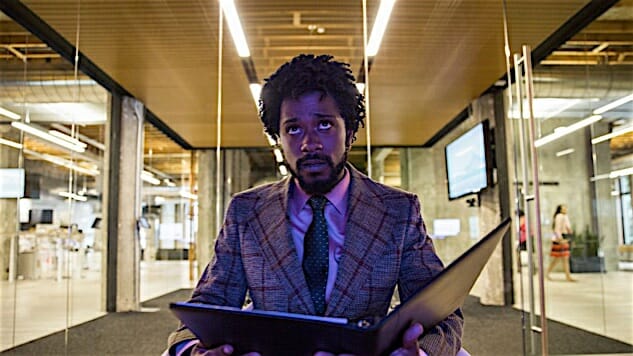Sorry to Bother You Understands Our Surreal Reality
Boots Riley’s dystopia is all too recognizable.

Note: This discussion of Sorry To Bother You includes significant spoilers for a film whose third act comes out of nowhere.

The creepy part of the best dystopias is that they’re always somebody’s utopia. Sorry to Bother You, Boots Riley’s stylish grand slam of a directorial debut, makes clear from the beginning who those privileged few are and indicts their complacency while also saving plenty of cautionary criticism for the rest of us. I haven’t seen anything like it since Terry Gilliam’s Brazil.
Just as that deeply disturbing feature seemed to take inspiration from the Thatcherite/Reaganite climate and put a funhouse mirror up to it, Sorry to Bother You is here to cry out in warning about our current moment. We all have times in our lives—sometimes for years at a time—when we feel like grabbing everybody and shaking them, ranting, demanding to know why we’re the only ones who see how messed up the situation is. Sorry to Bother You is a film that is coming from that place.
Set in an Oakland that might be the near future or just an even more off-kilter present day, the movie follows a down-on-his luck young Black man named Cassius Green (Lakeith Stanfield, whose role here still qualifies as the second most terrifying victimization one of his characters has suffered behind his appearance in Get Out). Cassius has almost nothing: His room is a garage with a malfunctioning door, rented to him by an ornery uncle (Terry Crews). His car is deathtrap on wheels. He’s so hard up for a job that he fakes a résumé and an award just to try to seem more competitive for a telemarketing gig.
When his lie is found out, he gets the job anyway, because, his vaguely scuzzy boss informs him, there are basically no qualifications except for one: Stick to the script.
I worked in telemarketing for one summer. (Don’t pity me: I refused to take money from my mother to make rent while I took college summer courses.) I’ve worked in fast food delivery, in construction, in four different flavors of godawful retail, in janitorial (it was actually kind of nice), and in the dying newspaper industry. Telemarketing was by far the most unbearable job of them all, and Sorry to Bother You is entirely dialed in to why that is. Try as call centers (or Amazon warehouses, or fast food joints) might, they can’t design a machine that will bridge that last little gap between their flawless workflow script and the hapless humans who have no choice but to bow to their functional monopoly and fork over money for a good or a service. That gap must be filled by a human, but the less time spent worrying about their humanity, the better.
Cassius struggles at first to succeed even in this job, which is basically built around the law of averages. Call enough times, and you’ll get some sucker who’ll buy whatever foolishness you’re selling. But we know he’s a guy who has, or who wants to have, meaningful connections with people. The photo of his father, never very far away from wherever Cassius happens to be at the time, is always changing depending on whether he believes his father would have encouraged or berated him. Whenever Cassius dials in to another potential mark, he literally appears in whatever setting in which they answer their phone. I thought this was the movie’s gimmick for one feverish moment and then, no, it rocketed on to the actual one: After counseling from an old veteran (Danny Glover), Cassius discovers that he has a White Voice inside him.
Equipped with this superpower (dubbed in courtesy of David Cross doing what sounds like his most earnest Zack Braff impression), he rapidly starts racking up sales. Meanwhile, his coworkers around him grow ever more frustrated with the poor pay and unbearable office culture, spurred toward a general labor strike by traveling union man Squeeze (Steven Yuen, in a role with some actual dimension to it). Cassius also has to balance his ambition with the political radicalism of his starving-artist girlfriend Detroit (Tessa Thompson), who, it’s revealed at a late-night debut of her performance art, has a White Voice of her own.
-

-

-

-

-

-

-

-

-

-

-

-

-

-

-

-

-

-

-

-

-

-

-

-

-

-

-

-

-

-

-

-

-

-

-

-

-

-

-

-








































